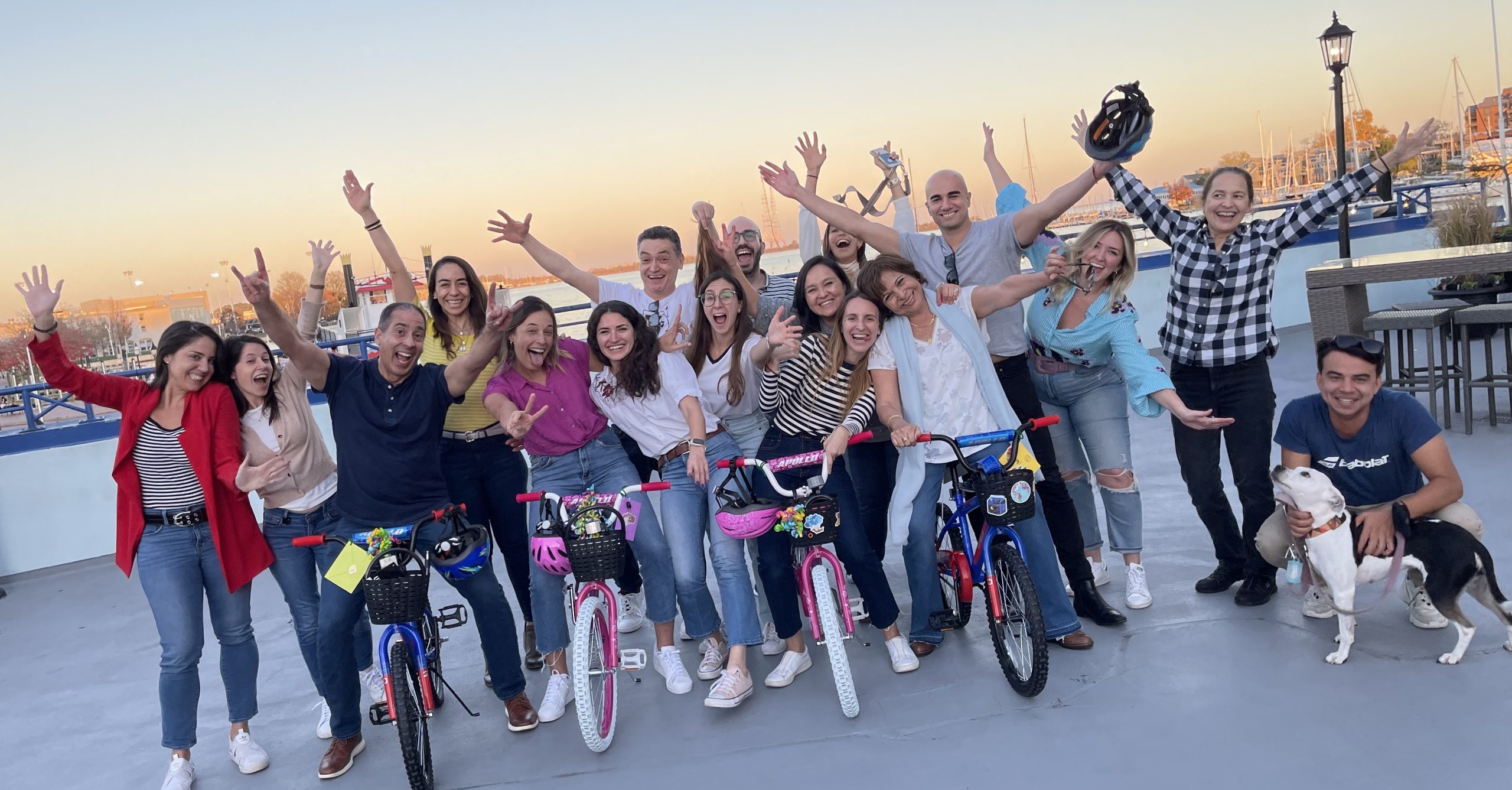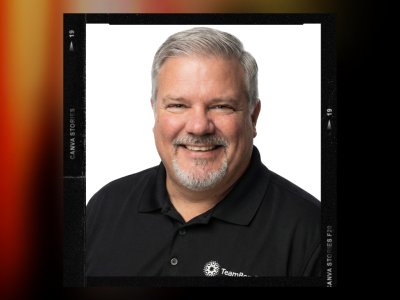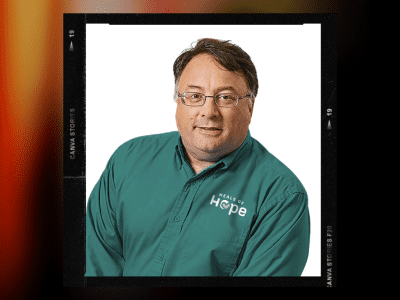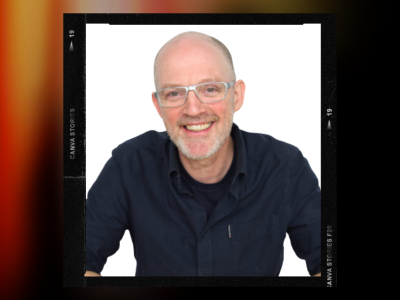STRONG TEAMS DON’T HAPPEN BY CHANCE 
Laughing it Off
w/ Patrick Short

Use the buttons above to listen now.
Transcript - Laughing it Off
Rich Rininsland: On this episode of Team Building Saves the World.
Patrick Short: I went to their first show and went, “I have made the worst mistake.”
You’re not face to face with somebody, you can lose as much as 93% of the content of what they’re saying.
We’re working on our Yes muscles because our No muscles are very, very well exercised.
There are people that, where they’re like I’m really afraid, but I’m doing this.” At the end of it, they’re, they’re sassy, they’re ready to go.
Rich Rininsland: Hello, team. It’s me. Your old friend, Rich Rininsland, host of Team Building Saves the World. And I gotta say this was a good episode for me. Now, I have enjoyed all of our guests, particularly this season, but there is a special joy for me when I get to speak with another improv performer.
And today. We have quite the performer for you. Patrick Short has been teaching, facilitating, and performing improvisation since 1987. He’s a globally connected leader in the applied improv space, and we’re gonna learn how he uses musical creativity and humor to unlock group potential. And communication in today’s ever-changing marketplace.
But first, I gotta share some love with all of my support at TeamBonding. If your team is ready to experience teamwork through the power of play, visit TeamBonding.com to learn more. Now, team, let’s talk about the revolution of improv all around the world with the Executive Director of CSz worldwide and board member for the Applied Improvisation Network and Access to Play Nigeria, Patrick Short.
Patrick Short. Thank you so much for coming on the show, my friend. It’s good to see you. How are you?
Patrick Short: I’m well, thanks. It’s a pleasure to be here.
Rich Rininsland: And if we can, because we have had improvers in the past, but I don’t know that we’ve had anybody who’s reached your level of expertise at it, so… if you can just give us a brief little rundown. Tell us what got you into this line of work and what it was about it that you thought you could take it to new heights.
Patrick Short: Wow, that’s a lot right there. The origin story is really, really long. And I’ll try to tell a, a short version of it. So I was in a grad school program at the University of Wisconsin in the 1980s.
I have an MFA in directing.
Rich Rininsland: Nice.
Patrick Short: And we were doing a summer stock show and our professor Del Lewis came to us. One night before a show during the performance thing and said, Hey, there’s this guy, he’s coming over from Milwaukee. He’s gonna do an improv workshop. I think you should go. And a bunch of us were like, “okay, we’re being paid to do theater this summer. We’ll do more.” And we went to this workshop and it was a guy named Dick Chudnow was coming from Milwaukee and he was doing, a competitive improv show at the time called theater sports. And we did a bunch of workshops and played games, and it was a blast. It was awesome. But when it came time to commit, I very wisely said, I’m gonna be in the third year of my MFA.
I have to direct two shows. I have to stage manage. I have to write a thesis. I have to do this and that. I also had a independent study that was… go form a theater company, license a play, rehearse it, take it on the road and sell it, kind of thing. It was pretty awesome, but that was gonna be a lot of work and so I chose not to join at that time and I went to their first show and went, “I have made the worst mistake. That looks like so much fun.”
I audience volunteered in a game and I went several times during the year, but because I had not joined at the beginning, they had sort of launched. They had a great group. There wasn’t a lot of room for additional players. I did a couple other workshops during the time. And then got a second chance because four of us from that program were hired by a children’s theater in Sunnyvale, California, called California Theater Center and moved out to California.
And one of those people was Jeff Kramer, who was a friend of mine. And he said, I’m gonna start ComedySportz out here. It was ComedySportz by that time. I’m gonna start ComedySportz out here and I want you to be in it. And that time I said yes. So we opened in the fall of 1987. September of 87.
So I’ve been playing ComedySportz for 38 years now.
Rich Rininsland: Including according to the background that I, that my team lovingly put together for you. That also includes teaching and facilitating, not just performing.
Patrick Short: And the interesting thing is I was teaching improv before I was performing it. I was a TA in a class called Creative Drama for Children, teaching teachers how to use theater in the classroom. And 90% of that was improv. And so I had a kind of a different background when we started than some other folks in traditional comedy improv. But, so I was, ComedySportz has a referee, and I was a referee for the first 52 shows.
Wasn’t planning on playing until I had to get thrown in to replace someone who was ill. And did Okay. And Jeff and I thought, “oh, you can play too.” All right, great. So I was with ComedySportz in San Jose for five and a half years. I was Jeff’s general manager, kind of the guy with the checkbook.
Putting systems together and, it was a really fun process of figuring things out and making things up, and at the same time, I had a high tech career with a company called Altos Computer Systems, later bought by Acer, who made it not so much fun. And I got a job with one of my best customers in Beaverton, Oregon, and my wife and I moved to Portland in fall of 92, and we opened ComedySportz in 1993.
We’ve now sold CSz Portland to Rick Steadman, a 25 year veteran of Spokane, Los Angeles and Seattle ComedySportz. He’s doing an amazing job. We’re on a two year consulting contract with him. We’ll probably even continue past that.
Rich Rininsland: Excellent.
Patrick Short: I just don’t have to do the day-to-day stuff and don’t have to make payroll right now, so.
So that’s the rough bones of the story. And the one fun fact about CSz Portland is we did a show Friday, May 28th, 1993 and have not missed a weekend since. Including the pandemic.
Rich Rininsland: Fantastic. Plus you’ve got your business side of it, which is your facilitation.
Patrick Short: Yeah. The origin story of that’s pretty funny.
In San Jose, we’re doing a show and ComedySportz players do a high five line with the audience on the way out, we greet them and thank them for being there and continue…
Rich Rininsland: Good game, good game.
Patrick Short: That’s exactly what we’re doing. We have one of our players who tells every audience member, you’re my favorite.
And that’s great. I also introduced in the eighties the arm bash from the Oakland Athletics, Jose Canseco and Mark McGwire instead of shaking hands because some slightly germophobic still do it to this day and now people understand. But we were doing the slap line high five line, and I’m arm bashing, and these guys literally pushed me up against a wall.
And say, “we want to think like you.” And first I made sure they were talking to me.
A group of folks from Apple, they were a newly formed group writing printer drivers. And doesn’t sound exciting, but if you need to print it’s exciting. They were having some trouble getting on the same page. They went to see ComedySportz as a team building activity, and they saw us to quote them working seamlessly together. And just following each other and helping each other. And I’d love for them to see a show now. But they wanted to work together so we didn’t know what to do. But we had a syllabus for performance improv for our 101 class.
And we came to an agreement to do six Monday afternoons in Cupertino. And the fun part is I didn’t even go teach them. I decided what was gonna happen each week was send two people who didn’t have day jobs and at the end of it, they came back. Everybody was really happy. We had a check. We stared at the check for a while and thought, this is all right.
Rich Rininsland: Excellent.
Patrick Short: And that’s where it started. And this is before the internet. So we were just announcing from the stage that we did improv training or team building with people, and it was Silicon Valley, so people bought it. And then over time we figured out we’re not teaching people to be performers. We’re teaching people to use the tools that performers use and share some of the culture that improv performers have when they’re doing it for the right reasons.
Rich Rininsland: Right, right. Yeah. And that’s what I want to dig into, like what is it about the culture of improv that you think the business world now needs more than ever?
Patrick Short: Well, that’s again, a huge question. A lot of it because of our screens and because we’re communicating a lot with text and short bursts on Instagram, and I mean, email even seems passé now. It seems very long form compared to how people communicate on, you know, slack and discord and all…
People aren’t used to communicating face-to-face. And of course, studies have shown. That when you’re not face to face with somebody, you can lose as much as 93% of the content of what they’re saying. You’re certainly losing any emotional content. And oftentimes misinterpreting emotional content. And creating problems. So to get in front of people is great, but you don’t just stick people in front of people and say, “Hey, talk to each other.” What we do is we give them a venue and formats to do that, that are comfortable and easy. So the maiden skills are in communication and a lot of it is I think listening skills are difficult for, and always have been difficult, but are even more difficult in today’s complex society than they ever were. And they’re far, far more important.
Rich Rininsland: And that takes us back to the fundamentals for the improv workshops because I mean, everybody by this point should know. And if you don’t, my friends, why don’t you that the number one fundamental of improv is what again?
Patrick Short: Well, I think it’s listening. The everybody talks about yes and, and that’s great, but you’re not gonna get to Yes and without listening. So it’s even the undercurrent of absolutely everything. We often tell people when we’re teaching in our adult classes, and these are people who maybe they wanna be performers, maybe they just wanna see what improv’s about.
Maybe they took judo last month and they’re gonna take knitting next month, and they’re taking improv this month. Either way. They’re often surprised to find out that listening is more important than being funny or having presence or any of those other things. Now we can’t teach presence, but we have a lot of professional players who, you’d be surprised if you saw ’em off stage that they were professional improvisers, honestly.
But that’s learnable, absolutely learnable. Now. There’s some people that walk on stage and immediately fall in love with them. And I wish I had that because I wouldn’t have to work so hard. Really truthfully, the main thing is listening to what’s going on, listening to your scene partners, and then acting on reacting to those things.
Listening is absolutely fundamental. Also, another really important thing in performance improv, a little less important. Out in the business world is we try to discourage people from planning too much. Now, yes, build a framework, but you can’t expect everything to go according to plan and you can’t force it.
So the improv thing I like is if this, what’s next. Rather than, I don’t like this, I have to change this and get it back to where I thought it was going to be.
Rich Rininsland: Yeah, yeah, yeah. I have seen and taken part in so many shows myself where improv shows very specifically where, and this always happens, you have those groups who just know where the funny has been before.
So they’re always somehow trying to get the audience, you know, they wanna take the audience with them. Of course, everybody wants to be entertained, but they’re trying to get them back to that funny, not taking the funny as it comes from the audience.
Patrick Short: Right. And that moment, if it was great, that was a singular moment in time and it’s gone. Go find another, go find another thing. And also sometimes revel in the stuff that’s not working
Rich Rininsland: Right. Exactly. Like Bob Ross used to call them happy little accidents.
Patrick Short: Yes.
Rich Rininsland: It works just as well with painting as it does with improv.
Patrick Short: Absolutely. Improv is a whole series of, of accidents, most of them happy.
Rich Rininsland: And also just the, I mean the, the reason we even bring up Yes and is because it’s supposed to be taking those, that listening skill and not only taking in what is, what is being given to you, but building on it.
Patrick Short: Absolutely. And a lot of people hear yes and, and say, oh, I need to say yes no matter what.
And honestly in at a very beginning level, it doesn’t hurt to start sentence with Yes and those are training wheels. Put them away eventually. The great applied improvisation teacher Sue Walden. She died in the last couple of years. A really, really phenomenal person. Used to do a breakdown with a group.
I mean, she didn’t tell people what yes and. She just did a breakdown, a workshop that broke it down. And the workshop that I was in broke down: yes and to respect and inspiration. The yes part is respect for the other person, other people. For their ideas, even respect for bad ideas. It’s almost respect for the process rather than what the product is and the inspiration part. The and part is inspiration. It’s like, I hear you, I see you we’re in this together and here’s what I’m gonna contribute. That’s yes, and, and don’t expect that the and is the last answer.
Rich Rininsland: Right.
Patrick Short: Other folks are gonna Yes and you. So you can, you can absolutely say no. We actually had some exercises of, up until about 15 years ago, we would tell people in these corporate exercises, you can’t say no in this game.
Don’t say no. And part of it was smart. We’re working on our yes muscles because our no muscles are very, very well exercised and we need to exercise our yes muscles, but at the same time, you start to get into some absolutely fascinating debates around consent. If people can’t say no, and part of it is we don’t want a character saying no to the, or an improviser saying no to the improv situation unless they feel threatened.
Rich Rininsland: Mm-hmm.
Patrick Short: Or endangered.
Rich Rininsland: Mm-hmm.
Patrick Short: But characters can say no. Characters say no all the time. And we just don’t want it to be the default. And so we’re training it to not be the default.
Rich Rininsland: My teams and I, from improv I’ve worked with in the past, came up with the yes but. So you’re still taking it in. You’re still acknowledging that the receipt of that idea, but you’re massaging it a little bit more than just accepting and building.
Patrick Short: Yeah, there’s, there’s, there’s danger in that too. Yes but can be a fancy way to say no. Like, I know I’m supposed to say yes, I know I’m supposed to honor you, but the idea sucks.
Well how many times has a great idea sprung out of an idea that sucked?
Rich Rininsland: Mm-hmm.
Patrick Short: Lots of times, like any idea is better than no idea. I tell people when I’m teaching in a one-on-one level that honestly what I’m teaching you here over the seven weeks is just make a decision.
Rich Rininsland: Yeah.
Patrick Short: You don’t know what’s happening, decide what’s happening.
Rich Rininsland: Mm-hmm.
Patrick Short: Anything is fine. And anything you say, the stupidest thing you can say is better than nothing. ‘Cause your teammates can take it and double down on it and make it hilarious, or they can take it and fix it. There are so many things that can happen as long as you do something, make a move, and then, you know, see what happens.
And then sometimes if it was terrible, once again, it’s gone. We’re not gonna worry about it. Unless you’re videoing it and then just gonna constantly rehash itally since the pandemic, we stream all of our shows, but it’s actually at a certain point it becomes very, very helpful tool to go back and look at what things actually looked like.
We kinda discouraged beginners from doing that. Like if, if we do a showcase at our 300 level and it’s their first show. Yeah, we do stream it so that people can see it from around the country or around the world if they need to, but I do tell them don’t go watch it. Just live in the moment. You can watch stuff later.
Rich Rininsland: But why do you think it works?
Like, why do you, what do you think that a business organization, or just even more importantly, the individuals involved in a business together, why do you think this level of teaching works for them?
Patrick Short: I think it’s because for many people it’s a revolution. That’s not how businesses have always worked.
We’ve always worked with top down, here’s the plan. Do it this way, you know? Then by the time it’s too late, the plan didn’t work. We’ll do a new plan. And the idea that everybody’s ideas are valued, everybody can and should make decisions at almost any point as long as they’re competent to do so.
We have a list of things. And, and on that list was listening, accepting, supporting, taking competent risks, letting go of mistakes. Competent was an ad, you know maybe 20 years ago, but I was telling corporations we were gonna teach, taking risks. They didn’t love that idea. Taking competent risks, stepping in, figuring things out.
Then maybe. Stepping outside the lines or shaking things up, that’s fine. If you come in the first day to a new organization or a new division, new company, you’ve just bought perhaps even a new social media giant that’s new to you, you don’t just blow it up right away before you understand how it works, and or maybe you do and it loses 90% of its value.
I don’t know. Could be good example. Just not naming names. ’cause they’re listening.
So the, the fact that you can build a culture where people feel value, where their ideas are valued, where they’re gonna be listened to, where everybody can contribute and everybody has a, if they have the perspective they can lead. Those organizations are more adaptable to change. And they’re more resilient when things don’t go right.
Rich Rininsland: Now let’s talk music improv, because you don’t just work with the standardized type of improv. What about music improv that inspires that same sort of feeling, that same sort of connectedness?
Patrick Short: Yeah. Let’s, let’s be very careful that the music improv and the corporate improv, the, the Venn diagram has only a sliver… I have done I think three corporate workshops where I’ve incorporated music in my career. So it’s not often, you gotta be deep and trusting to go there.
Music improv. I come from a musical background. That’s how I got into theater ultimately. And I played piano since I was eight years old. I’ve written songs since I was about 13.
Rich Rininsland: That’s awesome.
Patrick Short: My brother taught me how to voice guitar chords on the piano, and that just kind of turned me loose. So technically I am not a gifted player, but I can make stuff up.
That’s super helpful. So music improv, it’s like if improv is a high wire act. Music improv is being on that high wire between two skyscrapers. It’s it’s very scary. Music is so tied to people’s souls that to let loose with it is a, is a real act of courage. And when we teach music improv, we’ve gotta get almost everybody past some level of having been told that they’re not good at music.
Because everybody’s been told that at one point or another. Even the really good musicians have run through a teacher who decided they weren’t the gift. And there’s, it really is. It’s tucked into different part of your brain. I think it’s really attached to your soul.
It’s, it’s tremendously important to people, even to non-musical people who don’t know it yet.
Rich Rininsland: Mm-hmm.
Patrick Short: And when you can improvise musically, it’s absolutely liberating. It’s unbelievable. It’s so regular improv stage performance. Improv is a little like jazz. You agree on a framework, and then you’re gonna play inside that framework.
Rich Rininsland: Okay.
Patrick Short: In jazz, they’ll say, here’s the key we’re playing in kind of the idea that we’re playing with. We’ll, you know, sometimes jazz is really structured, but in, in a lot of free jazz, we’re just gonna start and we’re gonna see where it goes. We do in music, improv, a bunch of structures, and then that can get freer and freer as people get more experienced.
So within our ComedySportz shows you know, ComedySportz is in 25 cities. Some do more music than others. Our Portland team is, because I play keyboards, has always done a ton of music, but we’re pretty good at it. We’ve got a, a, a pretty deep bench for it and a couple other really fine keyboard players over the years.
And one superb, absolutely superb musician that we’re working with right now. And this allows us to just elevate our show by doing musical stuff because the fun part of musical improv is, it’s a bonus if it’s funny, but it absolutely doesn’t have to be at all.
Rich Rininsland: Right.
Patrick Short: It’s still magical.
People hit harmonies. They end a song together. Wait, they invented a chorus together. Audiences are are blown away by that. And we have a an improviser who works with our video screens. We have an inside program. One of our players, Bill Cernansky, wrote a program called Janice. And Janice is a PC based controller for our video screens.
Mary Ann Rambo from our team had just leaned into this about 20 plus years ago. And is an absolute wizard at throwing images up. And other things, one things Mary Ann would do if she recognizes a chorus, the next time the chorus comes around, she puts up the words and the audience sings along.
And there’s something absolutely magical about that.
Rich Rininsland: Okay. I was about to say, how hard is it to get people to want to actually play with this? Because I imagine, I imagine it’s slightly easier with just regular improvisational games than music because like you say, music is so important to people.
Patrick Short: We have some really skilled improvisers on our team who are terrified of music and, and we make them do it. And there are people on our team over the years, again. Portland’s been going for over 32 years, and there are people that joined us in the nineties who would’ve classified themselves as tone deaf, but we just kept working on ’em.
And they became singers. Do they have traditionally beautiful voices? Maybe not. Can they get audience all pumped up about their passion and excitement during a game? Absolutely.
Rich Rininsland: Yes.
Patrick Short: And it’s, it’s, a lot of it is just about commitment and it’s hard with all the fears built around music to get committed easily.
So the classes that we teach. To that we have a three stage class, an intro and intermediate. We’re doing the intermediate right now. A four week class. And then we have an advanced class that’s five or six weeks where they, they actually grow to showcase at the end of it. And there are people that, you know, at the start of 3 0 4, they’re like I’m really afraid, but I’m doing this.
And at the end of it, they’re sassy. They’re ready to go. It’s awesome. And you can constantly work on getting better. I mean, I still need to work on getting better at what we’re doing. But we’ve done some really, really cool things. 20 years ago or so, we had a side group called Screaming Mimis that did 45 minute rock operas. No spoken word. We just rocked through four and five part harmonies. We played at some festivals and, there people would come up to us and go, I’ve never heard people do that kind of harmony in an improv thing before, I’m like, that’s cool now. Lots of people are doing it right. Which is great.
We also, two other shows I’m currently working and I have a duo based in Portland called AlleyLoops. So Emily Larkin and I have a keyboard and a Boss Looper, and we sing and we get people’s stories about positive things and we turn them into songs. It’s all very hopeful. And sometimes it’s from the beat up.
Like Emily will beatbox, I’ll add a baseline and we’ll get noises from the audience. We add them to the looper. And then we play and sing along to that. The other thing that we do is we have a bunch of styles in there. We have people pick a number and we have to invent the style, including Emily’s favorite Number 57.
It’s a jazz thing and it came up four shows in a row and she’s sick of it. But I also have an electronic wind synthesizer that I can play saxophone on. And we were doing a show in Boise and I whipped that thing out. We did a little talk back and forth between her and me playing on the saxophone and, we were doing two shows on a Friday and Saturday night. And the Saturday night people were like, oh, you need to play the sax again. And I was like, yes. I only practiced it with that one loop. So you don’t wanna hear. You don’t want to hear that. Truly improvised, trusting. Singing. Sure. I’ll do anything.
But…
Rich Rininsland: And dare I ask the Janice program, is that named after the Muppet from Dr. Teeth?
Patrick Short: It should be. It’s just another nice improv scoring system is where it came from.
And now Janice has a personality of her own. And let me tell you we just moved theaters. We were in the same space on the same street for 32 years in the same theater for 29.
We just moved to a new location. And even though I’m retired, I was in charge of moving the tech. So the lights, the sound the streaming and sort of co-working with Janice. And Janice has been…
Rich Rininsland: Is she being diva-ish?
Patrick Short: Yeah. Like yeah, I worked the last two days. I’m not gonna work today.
We discovered that after a certain length of HDMI cable, you have to have a certain kind of HDMI cable that we didn’t have because we had shorter runs in our previous theater. And all of a sudden it’s like, oh. You need a directional kind of powered HDMI.
It’s ridiculous. Anyway, yeah, Janice. Janice supports all the, all the stuff that we do in AlleyLoops. Emily and I are up there doing, we’re getting stories from people, and Mary Ann is popping pictures related to what they’re doing while we’re doing it’s really, really super fun. The other musical show that we just debuted in May, it’s coming back November 1st for a two month run is VisionEuro. It’s a Euro improvised Eurovision knockoff that was invented at CSz Seattle by Erica Lowe and David Gordon, who did this brilliant job of distilling the energy of a Eurovision contest Grand final into a night of improv. So the actors. There are four competitors a night. It could be a duo, it could be a solo, there’s a host, there are other improvisers to assist.
Rich Rininsland: Mm-hmm.
Patrick Short: And the competitors find out what country they’re representing on stage at the beginning of the show. Nice. So, oh, you’re from Germany, you’re from Iceland, you’re from Croatia, from Ireland. And then we see the background stories. Everybody has to be in dialect. We see the background stories.
There’s a pre-party song where everybody sings together. Then the competitor songs happen and we, the audience votes on a final audience. All has flags that they’re waving. And I have never been an improv show where the audience was that loud. It’s something else. So we had maybe five empty seats at the first one, and the last three weeks were jam packed, sold out, and I, so our our new owner asked for two months this time, so…
Rich Rininsland: That’s fantastic. Good for you.
Patrick Short: We’re coming back. Yep. Talk about yes and. The folks from CSz Seattle were like, ” oh yeah, we’d love to have you do the show. Here’s all the help. Here’s music, here’s this. Here are, information sheets, here’s all this stuff that you can adapt. Oh, we’ll come down and come to a workshop and give you notes”, which they did. Phenomenal.
And we even had a, a, a slot where we had one of the players who’d played in Seattle come down and play in Portland. And that was amazingly successful. So looking for more of that.
Rich Rininsland: But speaking of Eurovision you do a lot of cross continental work with different companies, don’t you?
Patrick Short: Yes.
The pandemic caused that. And I’ve taught in five countries physically in 44, if you include Zoom.
We’ve had, obviously that’s slowed down some, but we still do online work. I taught it in, in a class in Indiana University’s Kelley School of Business, just last week for instance.
But yeah, mostly American companies with branches elsewhere. Super exciting. On one of ’em, there was a company based on the East coast that had branches in Nigeria and Uganda and Kenya. And I have an associate in Nigeria and I thought, well, I’m gonna need a sidekick. You know, there’s gonna be people from Africa.
Why I have somebody from Africa be a sidekick. So Damilola comes on to the thing and the people come on the screens and the manager of their office in Nigeria and Damilola knew each other. So that country has 330 million people and they knew each other.
So, that’s kind of magical.
Rich Rininsland: Yeah. Very.
But have you, have you discovered that improv means different things to people of different nations?
Patrick Short: I think that it’s viewed as a very North American thing. Canadian American. That’s changing and I think people are much more exposed to it. Obviously it’s, it’s more deeply penetrated in North American, Europe and Australia and New Zealand, than perhaps other places. But I’m a member of the Applied Improvisation Network, which is a organization of people who do. Improv train, applied improv with either business or in education or social settings. And there are thousands of members on every continent except Antarctica, but I think somebody’s been there.
So Asia is coming up. Africa, I can think of three practitioners in that whole continent right now. Okay. But so there’s certainly work to be done to do some outreach. And spread the word. But previously mentioned, I’m I’m on the board of Damilola’s Nigerian organizations. It’s called Access to Play, and they’re currently doing work in displaced persons camps, refugee camps in Benue State in Nigeria.
There’s, there’s a huge conflict between nomadic tribes and villagers who, you know, sort of set aside and fenced land. And basically it’s a war. People are being chased out of situations and then put into camps and literally USAID was in those camps and then pulled out. And there’s nothing except food and shelter, no programs whatsoever. And Damilola and his team, have gone in and worked with teens, with young women, with victims of gender-based violence and with what he calls elder women. But I don’t think you want to hear where that number starts. Would be insulting to some people.
That’s improv on the ground.
Rich Rininsland: Sure.
Patrick Short: That’s as important as anything anybody’s ever done that. I, I mean, that’s saving lives and making lives mean something.
Rich Rininsland: But when you talk, when you talk about the distances between people, ’cause in the beginning we were even talking about how, you know, people who work in the same company rarely speak face to face to each other anymore.
How, how have you seen that improv has helped the cross communication between those different countries?
Patrick Short: Well, I’m told that it’s much easier for people to pick up the phone or hit the button on the computer and FaceTime or equivalent. Rather than just texting Discord, slack, emailing, we get that feedback that people are much more connected because they have found they’re, they’re viewing each other as people and not just positions.
Rich Rininsland: Okay?
Patrick Short: Tendency to put people in org charts and put them in positions. And that’s the person who runs that department. But the person who runs that department could be an important person in my network. I mean, it’s not just a personal thing, it’s we’re better work will happen if I recognize that everybody around me could be a help and I could be a help to them.
Rich Rininsland: Hmm.
Patrick Short: When I was in customer service and the tech industry a long time ago.
Cause it didn’t take me long to get into sales. Just ’cause I showed up and looked interested. My sort of idea was I wanted to be the second to last person in the company that somebody needed outside the company needed to talk to.
And that’s a message that I like to convey everybody is in customer service. It might not be your problem, but it’s your problem in a big sense. And the best thing to do is to get them to the right place and not just fob them off on something. Not just say, “oh, I have to transfer you”, but make sure that it’s the right person.
And we’ve all had the experiences of getting bounced around ridiculously from companies where they don’t have a culture where anybody cares about that. I honestly wish we could do far more work in call centers than we’re allowed to. We’ve done some but in, in nowhere is it more important and probably less less improv than in those situations.
Rich Rininsland: Yeah, yeah, yeah. When you just gotta follow a script. That’s the waste of human potential. That’s, that’s, yeah. It’s, there’s no communication happening there.
Patrick Short: Absolutely insane, and I’ve had a couple of situations as a customer or a client. They’re clearly on a script and I’m like, please listen to me.
You can skip 12 of the 13 questions because I’ve been through them before. You know, it’s our X, Y, Z, ID got changed. That’s why our internet service isn’t working. We know this and you know, getting through can be tough because folks in that kind of thing, they actually get punished for stepping outside the lines.
Rich Rininsland: Yeah, exactly right. Exactly right. Yeah. And no time is allowed to create that interaction between you and the person on the other end of the phone, right?
Patrick Short: When the job is to get people off the phone. That’s, that’s a broken culture. And one of the things that I love to preach is the customer service is an opportunity, not a cost.
It’s an opportunity. In CSz Portland, our whole thing, I almost wanted to go around making mistakes so that we could fix them. And whenever anybody has a ticket problem and they call in and we’re like, oh, we’ll fix that. They’re like, what? I don’t have to yell at you? Just yesterday I’m no longer the owner, but I’ve been demoted to education director.
I got a call from a woman who was the second night of our 101 class, and her situ domestic situation has changed. She doesn’t have childcare. She doesn’t think she can do the class. And I was like, email me and we will put your registration into the next time 101 happens in January.
And she’s like, what? That’s it. It’s so easy.
Rich Rininsland: Yeah.
Patrick Short: Yeah. I mean, no, we can’t give you your money back ’cause we spent it already, but we’ll take care of you.
Rich Rininsland: Patrick, this has been amazing. I mean this, what a wonderful conversation this has been. Thank you so much again for coming on.
Before we say our farewells and play some games together, can I just ask for those people out there in my team who are listening now and they’re thinking, well, this sounds good. It all sounds very positive and uplifting and you know, forward thinking, but I’m just not sure. Is there any way we can just get that person over the hump into realizing this is something that you know they can use?
It to better their own culture, their own interactions, so forth.
Patrick Short: Well, it’s a really, at some point, it’s a leap of faith. Every client who reaches out to us who has not had direct experience with it, even if somebody told them it was great, it’s still a leap of faith. But what I like to tell people is, you know, if this really did not work for you and your group, if it was destructive in some way we’ll give you your money back.
Rich Rininsland: Hmm.
Patrick Short: Or we’ll give you a partial refund. If I sent somebody else, I had to pay them. And how many times have we done that? Zero. I’ve never had anybody unhappy on this side of our performance house. Once in a while our team will go into a road show, a performance thing, and it’s not the right fit.
And we do everything we can do to, to get things right. But just sometimes alcohol’s involved, not on our end but on their end. And it’s just not right. It hasn’t happened lately. I’m trying to think in the last 10 years. I don’t think it has, but it’s happened periodically, but in the training side, never.
And no one has ever said, this wasn’t worth my money ever.
Rich Rininsland: There you go, Patrick Short my team. Let’s give him a big round of applause. Thank you so much, Patrick.
Patrick Short: A lot more people listening than I thought.
Rich Rininsland: Yeah. Yeah. Well I keep them under my desk. You know, I throw food scraps at ’em and once in a while and they just really love applauding. Did you have a good time, my friend?
Patrick Short: I did. Thank you.
Rich Rininsland: Thank you. And I hope you continue to have a good time because it is time for my speed round.
Patrick Short: I can’t wait.
Rich Rininsland: Alright, just to remind you what this is… because this show did start off as facilitators, talking to facilitators, what’s gonna wind up happening is I’m gonna ask you over 60 seconds, a series of completely silly questions. Just to see how much more we can learn about you personally. And if you wanna make a game outta this, we want to gamify it, which we always love to do.
We have actually beaten 17 questions asked within 60 seconds.
Patrick Short: Oh, my answers will be too long to beat anybody on that.
Rich Rininsland: Don’t worry about it. Let’s just have some fun. That’s also what we do here. So when you hear music, which keeps me on track of the time, I’ll start asking the first question. Are you ready?
Patrick Short: I’m ready.
Rich Rininsland: Let’s go. What’s your name?
Patrick Short: Patrick Short.
Rich Rininsland: Do you have any kids?
Patrick Short: Two.
Rich Rininsland: Which one’s your favorite?
Patrick Short: Both.
Rich Rininsland: If you could be any fictional character for a day, which one would you be?
Patrick Short: I would like to be Superman.
Rich Rininsland: Tell us about the most unusual hobby you’ve ever had.
Patrick Short: Helping people clean something up.
Rich Rininsland: What’s the most unusual meal you’ve ever eaten?
Patrick Short: Oh, octopus.
Rich Rininsland: If you could have any animal as a pet, what would it be and why?
Patrick Short: Cheetah, it because they’re cool.
Rich Rininsland: Name a time where you laugh really hard.
Patrick Short: Last time, I actually watched improv showed art theater not being in it.
Rich Rininsland: Nice. Who’s the funniest person you know?
Patrick Short: My wife.
Rich Rininsland: If you could choose a nickname for yourself. What would it be?
Patrick Short: Electrical. That is my nickname.
Rich Rininsland: Pancakes or waffles?
Patrick Short: Pancakes.
Rich Rininsland: And if you could remotely work from anywhere in the world, where would you do it?
Patrick Short: I’d move a lot. London, Amsterdam, Iceland, Sydney.
Rich Rininsland: 14, buddy. You got 14. That’s really good.
Yeah, our average is somewhere between 11 and 13. So you are above average. That quick thinking part of your brain works.
Patrick Short: Thank you very much.
Rich Rininsland: Thank you. And Patrick for the last time, just just if there’s any way my team out there might have more questions about you or about CSz, where can they find you?
Patrick Short: Well, the easy thing is email Patrick@portlandcomedy.com. That’s patrick@portlandcomedy.com.
Rich Rininsland: Patrick Short, everybody. Thanks, pal.
Patrick Short: Thank you.
October 29, 2025
In this episode, Patrick Short, founder of ComedySportz Portland and lifelong improviser, shows how humor at work can do more than just make people laugh. From his start in the 1980s comedy scene to teaching Apple engineers how to “think like improvisers,” Patrick shares how the principles of improv and workplace humor help teams build trust, spark creativity, and stay connected — even when things don’t go as planned.
He also dives into the world of musical improv, where spontaneity meets melody and joking at work becomes an art form. With nearly four decades of experience and a career that’s stretched from Portland to Nigeria, Patrick proves that humor in the workplace isn’t about punchlines — it’s about play, perspective, and finding joy in collaboration. After all, a little work humor can go a long way in creating teams that listen, adapt, and laugh together.
About Patrick Short
 Patrick Short has been teaching, facilitating, and performing improvisation since 1987. As the founder of ComedySportz Portland, he has spent nearly four decades blending stage experience, musical improv, and humor at work to help teams and organizations unlock creativity, collaboration, and connection. Patrick is a globally connected leader in the applied improv space, having taught in 44 countries and worked with diverse groups ranging from Silicon Valley tech teams to refugee and displaced persons programs in Nigeria.
Patrick Short has been teaching, facilitating, and performing improvisation since 1987. As the founder of ComedySportz Portland, he has spent nearly four decades blending stage experience, musical improv, and humor at work to help teams and organizations unlock creativity, collaboration, and connection. Patrick is a globally connected leader in the applied improv space, having taught in 44 countries and worked with diverse groups ranging from Silicon Valley tech teams to refugee and displaced persons programs in Nigeria.
He has held influential roles including Executive Director of CSz Worldwide and board member for both the Applied Improvisation Network and Access to Play (Nigeria). With an MFA in Stage Direction, extensive experience in corporate facilitation, and a career spanning performance, consulting, and education, Patrick brings both depth and playfulness to the ways organizations communicate, adapt, and thrive — showing that a little workplace humor and improvisation can go a long way.
A little work humor can go a long way in creating teams that listen, adapt, and laugh together.
Patrick Short
More great podcast episodes.
Season 7 | Episode 1
The L&D Approach That Actually Works
Season 6 | Episode 18
That’s a Wrap!
Season 6 | Episode 17
Work-Life Integration
Season 6 | Episode 15
Corporate Volunteerism in Action
Season 6 | Episode 14
Collaborative Play at Work
Season 6 | Episode 13
The Science of Supportive Workplaces
Season 6 | Episode 12
The Power of Being Present
Season 6 | Episode 11
The Age Advantage


















